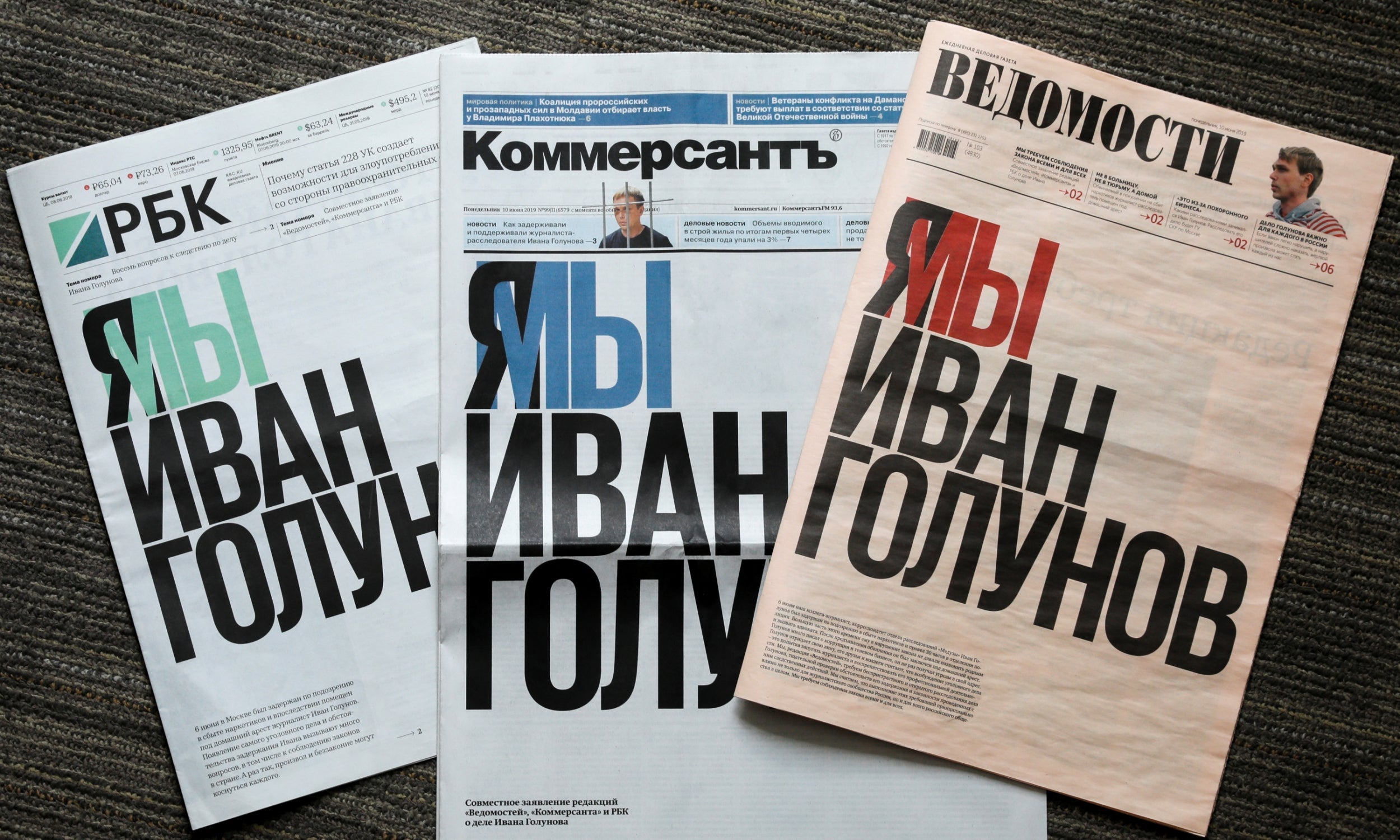Ivan Golunov: Kremlin admits ‘mistakes made’ after newspapers join forces to support detained journalist
Russia’s leading business broadsheets all ran the same ‘I am/We are Golunov’ front page

The Kremlin has accepted “mistakes” may have been made by police in the detention of Ivan Golunov, after the country’s newspapers joined forces in support of the journalist known for his reporting of government corruption.
“A mistake is possible, we need explanations,” presidential spokesperson Dmitry Peskov said on Monday morning. “Journalists make mistakes too. The important thing is to recognise mistakes so that they aren’t repeated.”
Mr Golunov, charged with drugs offences that he denies, was on Saturday unexpectedly released under house arrest pending trial. The court’s highly unusual decision to go against investigators’ wishes was hailed as a victory by friends and colleagues. It was made possible only by a spirited campaign of journalistic solidarity and resistance.
That unprecedented level of solidarity continued on Monday, when all three of Russia’s leading business broadsheets came out with identical covers in support of the Meduza journalist. Kommersant, Vedomosti and RBK – all ordinarily cautious papers – ran the same “I am/We are Golunov” title. It was the first time the papers had joined forces in such a way. The novelty also determined that the issue would become a collector’s item. By lunchtime, the vast majority of Moscow’s kiosks had run out of copies.
The three papers also carried an identical text that demanded authorities investigate legal violations and apparent fabrication of evidence.
Mr Golunov’s lawyers say police broke the law on multiple occasions: from denying him a lawyer to publishing photographs of a drugs laboratory that – as they were later forced to admit – were not in fact taken at Mr Golunov’s home. It seemed likely that Mr Golunov was beaten in detention.
Russian public opinion has been unusually scandalised by Mr Golunov’s arrest.
Almost immediately after that news broke, pickets began in several Russian cities. Some targeted police buildings, others prominent public places. “One-person” pickets are one legal form of protest that does not require prior permission from authorities, provided the picketers are at least 50m from one another.
In an even more unusual development, stable pillars of state propaganda also showed signs of wobble. Usually, state media lines up behind law enforcement in controversial cases such as this. But on Sunday, the stars of propaganda instead used their weekly news round-ups to hint that the police might not have behaved properly.
“Journalists are not angels, but neither are policemen,” said Russia’s NTV’s Irada Zeinalova.
“Drugs are a categorical evil. But so is corruption. If there were drugs, then we need to be given evidence, and those responsible punished. But if there were no drugs, we need to punish those who provoked such an outrage.”
The flagship of Russian propaganda, TV programme Vesti Nedeli, had a more nuanced take. Host Dmitry Kiselyov was careful to say there was little that was “professionally outstanding” in Mr Golunov’s work. But the publication of misleading photographs had “cast a shadow over the investigation”. Moreover, said Mr Kiselyov, the Ministry of Health’s leading toxicologist had confirmed that no drugs were found in Mr Golunov’s urine.
Pavel Chikov, a lawyer acting for Mr Golunov, later revealed that negative readings had also been obtained from an analysis of the journalist’s fingernails and swabs taken from his hands. That development seemed incompatible with police assertions that Mr Golunov had been involved in serious drug dealing in Moscow’s nightclubs.
Speaking to journalists in his daily press conference, Mr Peskov said that he had been wrong-footed by the photographs purporting to show a laboratory in Mr Golunov’s Moscow apartment. On Friday, he had referred to the photographs in answer to a journalist’s question about whether the case was a fabrication.
“As you see, I only see the official information,” he said. “This particular case has created a large number of questions. We see that, and we’ve recorded the issues. But we can’t make generalised comments about the system as a whole.”
While being careful to avoid direct comment on the quality of the investigation, Mr Peskov’s guarded comments seemed to indicate the Kremlin was not as sure of its own ground – or that of its law enforcement agencies – as it usually was.
On Monday, a group of activists and journalists announced that a march in support of Mr Golunov would be held in central Moscow on Wednesday.
The turnout will likely go some way to determining authorities’ next moves.
Join our commenting forum
Join thought-provoking conversations, follow other Independent readers and see their replies
Comments
Bookmark popover
Removed from bookmarks